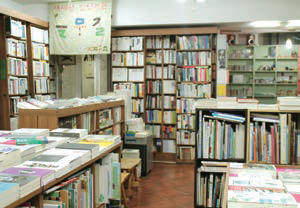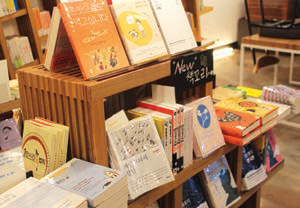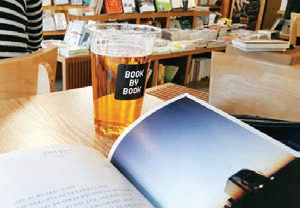Take a look around for a moment. Do you see any books within your reach? Some Koreans might actually enjoy reading books, but unfortunately the majority is well-noted for reading too little. Many Koreans seem to be already familiar with this criticism. Reading books, however, is an essential aspect of our lives, since it provides the depth and breadth of knowledge for lifelong learning. The Sungkyun Times (SKT) explores the current state of Korean book culture, and suggests Kingos who are tired of reading books for assignments and are using only the giant bookstore chains to visit a small-sized bookstore and keep their composure.
Korean Book Culture?
■ “Reading” in Korea
According to one research conducted by the Ministry of Culture, Sports and Tourism in cooperation with the Korean Publishing Research Institute, the rate of Korean adults who read more than one book a year was 65.3% in the last year alone. In other words, one out of three Korean adults does not even read a single book in a year. Besides, numerous experts point out the bestseller-driven reading habits of Koreans. A number of readers in Korea choose their books based on the list of bestselling books, rather than the reader’s own preference, which demonstrates their passive aspect in reading books. According to the Korean Economic Research Institute, the average reading rate for each year is directly related to future economic growth and global competitiveness. As such, Korean book culture seems to have a long way to go.
■ Behind the Book Culture in Korea
Why do Koreans rarely read books? According to the same research mentioned above, people who said they read fewer books reasoned that Koreans barely spend time on reading because they are too busy, or they use smartphones and computers too often. The underlying cause for the lack of reading, however, comes from the reality of schools. For middle and high school students studying only for the Korean SAT, reading books for leisure is considered a waste of time. This negative cognition towards reading books continues even after they become adults, which hinders the establishment a healthy reading habit. The SKT has explored another obstacle behind the book culture in Korea. The Fixed Book Price Agreement (FBPA), which was revised in 2014, is still generating controversy. The International Publishers Association (IPA) defines the FBPA system as a mechanism to fix the price at which books are sold to the public. The Korean government introduced the system in order to cease the fierce price competition among bookstores, and they set the fixed discount rate for each online, grand, and small bookstores. The FBPA system principally aims to support small booksellers and readers. Under the fixed price system, small booksellers can receive more opportunities to survive in a tight spot among giant bookstores. Moreover, the system allows readers to access a great diversity of books. In Korea, however, the FBPA system has been criticized for giving advantage only to the giant bookstores, not the small booksellers or consumers. Consumer Owing to the fixed discount rate, people readily feel that they are not able to afford books. According to the statistic from the National Statistical Office, the average expenditure for purchasing books in a month per household stood at a record low in the first half of this year, which is the lowest figure since 2003. Publishing Industry Since the consumption for books is reduced, the market of used books is growing rapidly, which makes it difficult for publishing companies to supply new books. Grand Bookstores and Online Bookstores Even though the sales of grand bookstores have dropped, their operating profit increased on a large scale due to the rise in book prices.
Book Culture in Other Countries
Compared to the domestic book market dominated by giant bookstore chains, plenty of independent bookstores in Europe account for more than 20% of the total revenue in the European book market, also playing a role as local culture space. France is the first country to implement the FBPA system, standardizing book price for all, unlike the Korean FBPA system which applies different discount rates for each bookstore. This was successful in promoting small booksellers such as Shakespeare and Company in Paris, well known as Hemingway’s favorite bookstore, to survive. Germany is also highly acclaimed for maintaining a desirable publishing market, largely because of the publishing industry which seeks for mutual interest. While the Korean publishing market is dominated by giant publishing companies, small-sized publishing firms preserving their own features can readily cooperate with the local independent bookstores in Germany.
Independent Bookstore, Distinct from Giant Bookstore Chains
As mentioned above, Korea has relatively fewer independent bookstores compared to European countries. However, as price competitions with huge discounts disappeared due to the FBPA system, there is a new wave of change. Approximately 100 small-sized independent bookstores are opening up nationwide. Interestingly, each bookstore reflects its unique feature, such as a bookstore only dealing with poems, and a bookstore allowing reading with a bottle of beer. They offer various programs from exhibitions to book clubs to communicate with readers and understand exactly what readers need. They call themselves “bookstores,” but they stand as a place where people can create their local culture, unlike other ordinary bookstores. The SKT introduces two famous independent bookstores in Seoul.
■ Pulmugil

Bookstore Pulmugil is a small-sized independent book store dealing with humanities and social sciences books. It is located near Sungkyunkwan University, just across from Cucurucu Barbeque. Since it was opened in 1985, people can find the trace of the time in the bookstore. Over 50,000 books are accumulated in the bookstore, and 90% of the books are humanities and social sciences books. Like many other independent bookstores, Pulmugil puts huge efforts in communicating with readers. Reading clubs in the theme of reading novels, poems, and others are held almost every week. The club is made especially in a space called “Pul-bang,” a room in the bookstore created for relaxation.
■ Book by Book


Bookstore Book by Book is a small-sized bookstore located in Sangam-dong, Mapo-gu. Book by Book is well known for reading books along with beer. It is a special place where people can enjoy their books while drinking a bottle of beer. Some people might think that it will be distracting, but an unexpected atmosphere of calmness greets people when they go into the bookstore. A special piece of paper called “Chaekggori” is also attached to each book, in which a short introduction and opinions about the book are written by the owner of the bookstore.
Book Culture in SKKU
■ The Current State To figure out the current state of reading culture in SKKU, the SKT referred to the statistics conducted by the SKKU Library. In the last half of 2015, undergraduate students borrowed an average of 8.4 books. Students in the College of Confucian Studies and Eastern Philosophy borrowed the most with 22.6 books, and students in the School of Medicine borrowed the least with 3.2 books.
■ The Ogeoseo (Five Wagons of Books) Project The term “Ogeoseo” derives from Tu Fu, one of the best Chinese poets, who said that people ought to read five wagons-full of books before they died. The Ogeoseo Project is literally a reading promotion project in SKKU that was started was started in 2009. It aims to encourage students to read a variety of books to gain an in-depth understanding. With this aim, the project is promoting diverse programs including Ogeoseo scholarships, SKKU reading guides, Ogeoseo book field trips, and many others. Last year, 21 students were selected to receive the scholarship of ₩500 thousand for their outstanding book reviews, and it has reached its eighth term this year. The Ogeoseo book field trip program, which received a positive response drawing 153 students, is going to be held again later this year.
Despite the undesirable environment for reading books in Korea, the success of local independent stores is obviously a positive move for establishing a strong reading culture. There is a well-known saying, “Man makes books, and books create men.” Maybe it is time to recover our lost humanity. To begin with, how about visiting an independent bookstore nearby and taking a look at a book that intrigues you?
